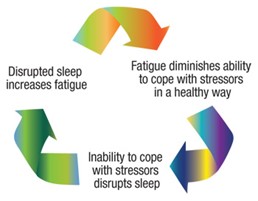Sleep is a vital factor in overall health. According to the National Health Interview Survey, adults need an average of seven to nine hours of sleep each night, but 30% report averaging less than six hours.
- Chronic sleep deprivation causes depression, obesity, cardiovascular disease, and other illnesses.
- Fatigue is estimated to cost employers $136 billion a year in health-related lost productivity.
- More than 70 million Americans suffer from a sleep disorder
Many professions and trades, such as mechanical workers and CDL drivers, healthcare and First Responders, law enforcement, and military, experience extended work hours in ever-changing environments that can cause significant mental and physical stress.
Enduring fatigue for an extended period may lead to chronic fatigue syndrome, a health problem characterized by extreme fatigue that does not improve with bed rest and continues to worsen with physical and mental activity.
Fatigue at Work can:
- Impair an individual’s mental and physical ability.
- Create a cycle of fatigue.
- This results in anger and emotional outbursts.
- Result in reduced productivity and safety misjudgments for one’s self and others.
- Limit job performance.
- Damage an individual’s health.
- Enduring stress for an extended period can lead to anxiety, depression, or post-traumatic stress disorder (PTSD). PTSD is a psychological condition marked by an inability to be intimate, sleep, increased nightmares, increased feelings of guilt, and reliving the event.
Cycle of Fatigue
How Fatigue at Work Affects Health
Fatigue arises primarily from inadequate sleep — both the quantity and quality of sleep.
Fatigue can harm a worker’s mental health by:
- Increasing mood swings.
- Impairing judgment.
- Decreasing a worker’s adaptability to certain situations.
- Heightening a worker’s sense of threat.
- Increasing anxiety or depression.
Fatigue can harm a worker’s physical health by:
- Reducing eye-hand coordination.
- Causing a worker to gain weight.
- Causing pain (e.g., backaches, headaches).
- Making a worker unable to relax (e.g., cause restless sleep, provoke a heightened alert response).
- Causing gastrointestinal problems (e.g., loss of appetite, abdominal distress, or ulcers).
- Damaging the cardiovascular system (e.g., causing heart disease, arteriosclerosis, or congestive heart failure).
Employers are in an ideal position to educate employees on how to avoid fatigue-related safety incidents. NSC supports science-based fatigue risk management systems in the workplace.
- Safety performance decreases as employees become tired.
- 62% of night-shift workers complain about sleep loss.
- Fatigued worker productivity costs employers $1,200 to $3,100 per employee annually.
- Employees on rotating shifts are particularly vulnerable because they cannot adapt their “body clocks” to an alternative sleep pattern.
Drowsy driving or machine operation is impaired driving (OVI) or operation!
SACS Consulting and Investigative Services Offers Workforce Safety Training
Give us a call today at (330) 255-1101 to ask about our workplace training to help make sure you have the most productive and safest workplace possible!


